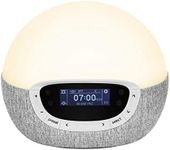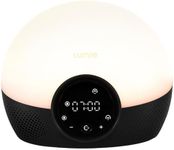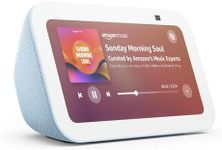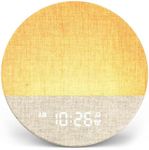Buying Guide for the Best Alarm Clocks
Choosing the right alarm clock can significantly impact your morning routine and overall sleep quality. When selecting an alarm clock, consider your personal needs, such as how you wake up best, your bedroom environment, and any additional features that might enhance your experience. Understanding the key specifications will help you make an informed decision that aligns with your lifestyle and preferences.Alarm TypeThe alarm type refers to the way the clock wakes you up, which can include sound, light, or vibration. This is important because different people respond better to different stimuli. Sound alarms are the most common and can range from beeping to radio or nature sounds. Light alarms simulate a sunrise to wake you up gradually, which can be beneficial for those who find sound alarms jarring. Vibration alarms are useful for heavy sleepers or those with hearing impairments. Consider how you prefer to be woken up and choose an alarm type that suits your needs.
Display TypeThe display type of an alarm clock can be digital or analog, and it affects how easily you can read the time. Digital displays often have features like backlighting and large numbers, making them easy to read in the dark. Analog displays have a classic look and can be quieter, as they often lack the ticking sound of some digital clocks. If you need to see the time clearly at night, a digital display with adjustable brightness might be best. If you prefer a traditional look or a quieter clock, an analog display could be more suitable.
Snooze FunctionThe snooze function allows you to delay the alarm for a few more minutes of sleep. This is important for those who need a gradual wake-up process. The duration and number of snooze intervals can vary between models. If you tend to hit snooze multiple times, look for a clock with customizable snooze settings. If you prefer to wake up immediately, you might opt for a clock with a limited or no snooze function to encourage you to get up on time.
Power SourceAlarm clocks can be powered by batteries, electricity, or both. This is important for reliability and convenience. Battery-powered clocks are portable and can be used during power outages, but they require regular battery changes. Electric clocks are more reliable for daily use but need a power outlet. Some models offer both options, providing flexibility. Consider your environment and whether you need portability or a constant power source when choosing the power type.
Additional FeaturesAdditional features can include radio, Bluetooth connectivity, USB charging ports, or smart home integration. These features can enhance your experience by providing entertainment, convenience, or connectivity. If you enjoy waking up to music or need a charging station by your bed, look for these features. If you prefer a simple alarm clock, you might avoid extra features that could complicate its use. Think about what additional functionalities would benefit your morning routine.














